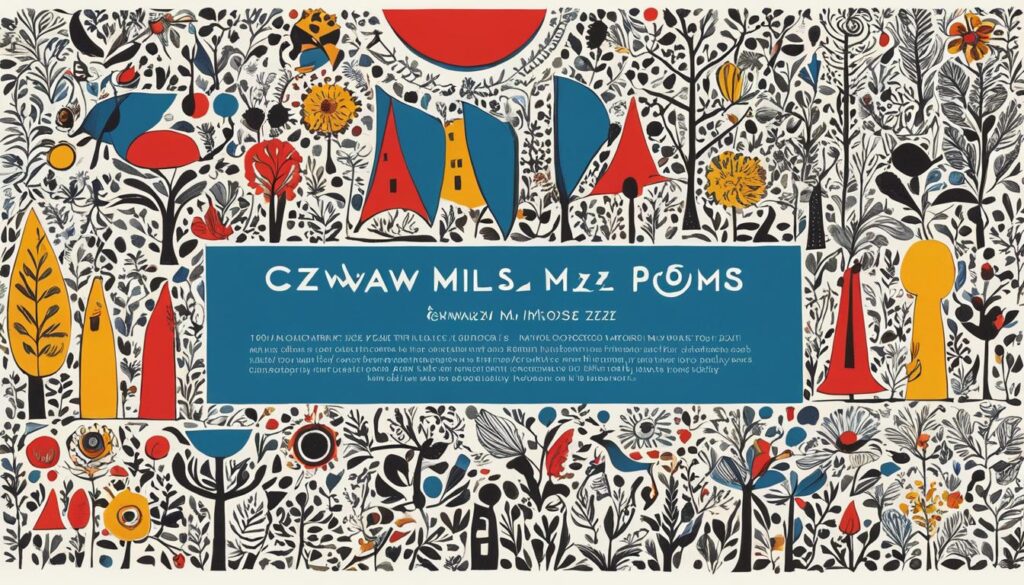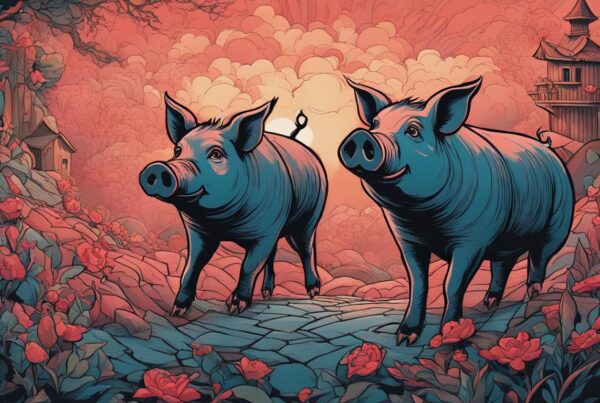For poetry lovers and enthusiasts, the book New and Collected Poems: 1931-2001 by Czesław Miłosz is a must-read. This expansive collection encompasses the poetic corpus of one of the most impactful poets of the 20th century. In this article, we will provide a book summary to give you an overview of what to expect from this magnificent work.
Introduction to Czesław Miłosz
Czesław Miłosz was a Polish-American poet, essayist, and translator born on June 30, 1911, in Šeteniai, Lithuania. He was a member of the Polish resistance during World War II and later served as a cultural attaché for the Polish government. In 1951, he defected to the West and eventually settled in the United States, becoming an American citizen in 1970.
As a poet, Miłosz was known for his powerful and complex works, which explored themes such as war, politics, and religion with a deep sense of humanity. He was awarded the Nobel Prize in Literature in 1980 “for his uncompromising and clear-sighted observation of the modern world.”
Throughout his life, Miłosz published a significant number of collections of poetry, essays, and translations, contributing greatly to the literary world. His works continue to inspire and impact readers around the globe.
Contributions to Poetry
Throughout his career, Miłosz’s contributions to poetry were extensive and varied. He experimented with different styles and techniques, always pushing the boundaries of what was possible with language.
One of his most notable achievements was his role in the development of the Polish avant-garde movement, which aimed to disrupt traditional literary conventions and explore new forms of artistic expression. Miłosz was influential in shaping this movement, and his work helped to pave the way for future generations of poets and writers.
Furthermore, Miłosz’s poetry often tackled social and political issues, such as the devastation of war, totalitarianism, and the struggle for freedom and human rights. His writing was informed by his experiences living through some of the most tumultuous events of the 20th century, and his poetry reflects a deep sense of empathy and compassion for those affected by oppression and violence.
Overview of New and Collected Poems: 1931-2001
New and Collected Poems: 1931-2001 is a comprehensive poetry collection that encompasses the lifetime of poetic mastery from Czesław Miłosz. The collection is divided into several sections and offers a range of poetic styles and themes for readers to explore.
Structure
The collection comprises 700 pages of poems and is divided into five sections, each representing a different phase of Miłosz’s career. The first section includes works from the 1930s, while the latter four sections cover his poetry from the 1940s up until his final works in the early 2000s.
Themes and Styles
The themes of the collection are wide-ranging, covering topics like history, religion, politics, love, exile, and more. Miłosz’s style is marked by his use of precise and succinct language to convey complex ideas. He often employs vivid imagery and metaphors that are both beautiful and haunting. His works are introspective, contemplative, and often explore the human condition.
Miłosz explores various styles like lyric, narrative, elegiac, and philosophical throughout the collection. His poetry is characterized by colloquial language, simplicity, and evocative phrasing. He often employs a fragmented form of verse, with lines of varying lengths that create a natural rhythm and meter.

Subject Matter
Miłosz’s poems often reference historical events and figures, including the Holocaust, World War II, and the Communist regime in Poland. He also writes about personal experiences, love, and relationships. He explores questions of faith, mortality, and the meaning of life, often expressing doubt, skepticism, and longing for answers.
“Something important happens when a poet finds as it were his second wind in middle life. He no longer feels a restlessness, a striving, an ambition to attain a height. His work becomes more sure of itself, and his role as a mediator between people and the world they live in more modest.” – Czesław Miłosz
Analysis of Selected Poems
In this section, we will analyze and examine three selected poems from the collection. Through analysis, we can gain a deeper understanding of Miłosz’s poetic techniques, themes, and underlying messages.
“On Angels”
“On Angels” is a beautiful elegy that contemplates the nature of death while also expressing a sense of hope. Through rich imagery, Miłosz evokes the presence of angels and imagines them as kind companions in the afterlife. The poem’s opening line, “My father said that the dead are visible only in dreams,” establishes the contemplative mood that runs through the whole work.
“The secret of angels is that they are not creatures of this world.”
The line above is an example of Miłosz’s use of paradox and enigma in the poem. The last two stanzas also present a vivid visual experience, evoking a sense of both wonder and awe.
“Old Women”
“Old Women” is a poignant poem that celebrates the strength and perseverance of aging women. The poem is autobiographical in nature, with Miłosz attributing his love for older women to his childhood spent around his grandmother and great-aunts.
The poem uses vivid imagery that evokes a sense of nostalgia, particularly in the line “In snow they trudged after Mass, / praying in chapel, fingers trembling.” The poem also explores themes of memory, loss, and regret, as the protagonist contemplates his own mortality.
“Dedication”
“Dedication” serves as a powerful introduction to the collection and sets the tone for the rest of the book. The poem is Miłosz’s tribute to the intellectuals and artists who stood up against totalitarianism and defended the values of humanism and freedom.
The poem is composed in a simple yet powerful language that reflects Miłosz’s commitment to clarity and accessibility. The poem’s final lines resonate with the reader, urging them to join the fight for justice and dignity:
“Dedicated to those who, / at every step, are forded with lies, / who do not abandon their efforts, / and, despite the passing of years, are ready to start again.”
All of the three selected poems showcase Miłosz’s unique poetic style, using vivid imagery, paradox, and an emphasis on the human condition to create powerful works of art.
The Historical Context of Miłosz’s Poetry
Miłosz’s poetry is inextricably linked to the historical context in which he lived. Born into a Poland that was only recently independent, he witnessed firsthand the tumultuous events of the twentieth century that shaped his work. His experiences during World War II, including his service in the Polish Underground, deeply influenced his poetry.
The Holocaust also had a profound impact on Miłosz’s writing. In his poem “Campo dei Fiori,” he reflects on the burning of books and the execution of Jews in Rome during the war. The poem is a haunting reminder of the atrocities committed during the Holocaust.
The political climate during the Cold War also influenced Miłosz’s work. He defected from Communist Poland in 1951, and his poems often explore themes of freedom and the struggle against oppressive regimes.
“So even death is not unimportant
When it is your death,
For bucks are torn during the mass
And the sheep’s blood is sprinkled with holy water.”
Impact and Legacy of Czesław Miłosz
As one of the most celebrated poets of the 20th century, Czesław Miłosz left a significant impact on the literary world. His contributions extend far beyond his own works, influencing a new generation of poets and shaping the direction of literary movements.
Miłosz’s writing was known for its profound insights into the human condition, exploring themes such as love, loss, and the search for meaning. His unique voice and style, influenced by his experiences growing up in a war-torn Europe, set him apart from his contemporaries.
His legacy continues to be felt in the world of poetry today, with countless poets drawing inspiration from his work. His influence can be seen in the themes and styles of writers across the globe, cementing his place as a true master of the form.
“Miłosz’s poems are universal in the way all great art is: they speak to something much deeper than the specific time and place that birthed them. His work will continue to be read and loved for generations to come.”
Themes and Motifs in New and Collected Poems: 1931-2001
In New and Collected Poems: 1931-2001, Czesław Miłosz explores a range of themes and motifs that recur throughout his works, offering insight into his overarching philosophies and perspectives. Here are some of the most notable:
Religion and Spirituality:
Miłosz’s Catholic faith plays an important role in many of his poems, reflecting his lifelong search for meaning and transcendence.
Nature and Landscape:
Throughout his works, Miłosz draws from the beauty and power of nature to explore human emotions and experiences.
Memory and Nostalgia:
Many of Miłosz’s poems feature reflections on his past and a sense of longing for a simpler time.
History and Politics:
Miłosz’s experiences during World War II and Communist rule in his native Poland inform his writing, offering powerful critiques of totalitarianism and a deep appreciation for freedom and democracy.
Mortality and Death:
Miłosz frequently contemplates the fleeting nature of life and the inevitability of death, reflecting on the fragility and impermanence of existence.
Love and Intimacy:
Miłosz’s poems explore both the beauty and complexity of love and personal relationships, often with a frank, unflinching honesty.
“The purpose of poetry is to remind us
how difficult it is to remain just one person,
for our house is open, there are no keys in the doors,
and invisible guests come in and out at will.”
From “Ars Poetica?”

Critical Reception of New and Collected Poems: 1931-2001
Since its publication, New and Collected Poems: 1931-2001 by Czesław Miłosz has garnered widespread critical acclaim.
According to The New York Times Book Review, the collection offers “an intimate portrait of the poet’s life and work, showcasing his mastery of language and form.”
Similarly, The Guardian states that “Miłosz’s poetry is both transcendent and deeply grounded in the human experience. This collection is a true testament to his talent.”
Other reviews have praised the collection’s range of themes and styles, with Publishers Weekly commending its “searing political commentary and poignant reflections on love and mortality.”
Overall, the critical reception of New and Collected Poems: 1931-2001 has been overwhelmingly positive, cementing Miłosz’s status as one of the most important poets of the 20th century.
Conclusion
In conclusion, New and Collected Poems: 1931-2001 by Czesław Miłosz is a stunning collection of poetry that showcases the depth and breadth of the poet’s lifetime of work. Through exploring Miłosz’s biography, the historical events that shaped his writing, and the common themes and motifs that emerge throughout the collection, we gain a deeper appreciation of his poetic techniques and underlying messages.
The selected poems we analyzed showcase the power and beauty of Miłosz’s writing, while the critical reception of the collection offers a broader perspective on its significance in the literary world. The impact and legacy of Miłosz’s contributions to poetry are evident in the influence he has had on future generations of poets and literary movements.
Overall, New and Collected Poems: 1931-2001 is a must-read for anyone interested in poetry or the complexities of human experience. Through this collection, we gain insight into not only the life of one of the greatest poets of our time, but also the universal truths that connect us as human beings.



